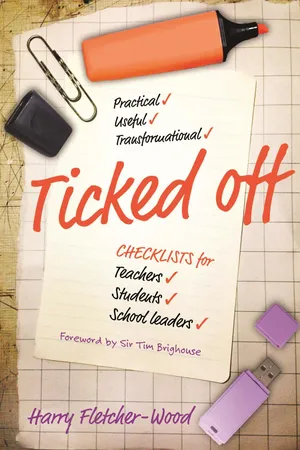
- 304 pages
- English
- ePUB (mobile friendly)
- Available on iOS & Android
About this book
Ticked Off by Harry Fletcher-Wood introduces teachers to the checklist, but not as they've seen it before. Discover the rationale for using checklists, the key design principles behind them and the effect they can have. Checklists are already used in medicine, aeronautics and construction and they can help teachers too. Learn a deceptively simple way of completing critical actions well, particularly when under pressure. Ticked Off contains checklists which offer teachers and leaders a calmer, more organised life and a healthy approach to workload and well-being. These checklists can be adopted or adapted: they are ready to use, but offer guidance, examples and suggestions so teachers can personalise them for their needs. Free downloadable versions make this easy for busy teachers. Checklists: free us to devote our time, energy and attention to focusing on the tasks that matter most; improve communication with colleagues and students; remind us of important steps which even highly skilled professionals may miss; offer us reassurance that, when going home at the end of the day, we've done everything that matters and can relax; and can make you a better and a happier teacher. There are checklists to simplify procedural tasks for students, including essay planning, setting up experiments and quality checking work, which will free up teacher time. There are checklists for teaching including: planning lessons, time management, giving feedback and assessing student needs and exam readiness. Checklists for teachers include: processes for reading research, preparing for job interviews, having productive meetings with parents, protecting well-being, and managing the daily and weekly demands of the role. Checklists for leaders cover: inducting middle leaders, making meetings work, designing effective CPD, using data and giving feedback. Additional checklists for living include: making decisions, what to do if you've made a mistake and making each school day a good one. Many things prevent teachers from achieving all that they would like, but most come down to a single cause: while students' needs are infinite, our time and resources are not. Some teachers seem intimidatingly organised in all they do. This book is for everyone else. Whether you're a teacher, teacher-trainer or school leader, everyone can benefit from the checklist approach.
Frequently asked questions
- Essential is ideal for learners and professionals who enjoy exploring a wide range of subjects. Access the Essential Library with 800,000+ trusted titles and best-sellers across business, personal growth, and the humanities. Includes unlimited reading time and Standard Read Aloud voice.
- Complete: Perfect for advanced learners and researchers needing full, unrestricted access. Unlock 1.4M+ books across hundreds of subjects, including academic and specialized titles. The Complete Plan also includes advanced features like Premium Read Aloud and Research Assistant.
Please note we cannot support devices running on iOS 13 and Android 7 or earlier. Learn more about using the app.
Information
Checklists for leaders
30. Have I been inducted properly as a middle leader?
Pause point
How else could this be used?
31. What does a unit of work need?
Pause point
Example
Table of contents
- Cover
- Praise
- Title Page
- Dedication
- Foreword by Sir Tim Brighouse
- Acknowledgements
- Contents
- Introduction
- i: Checklists for students
- ii: Checklists for teaching
- iii: Checklists for teachers
- iv: Checklists for leaders
- v: Checklists for living
- vi: Design your own checklist
- Conclusion
- Bibliography
- Copyright